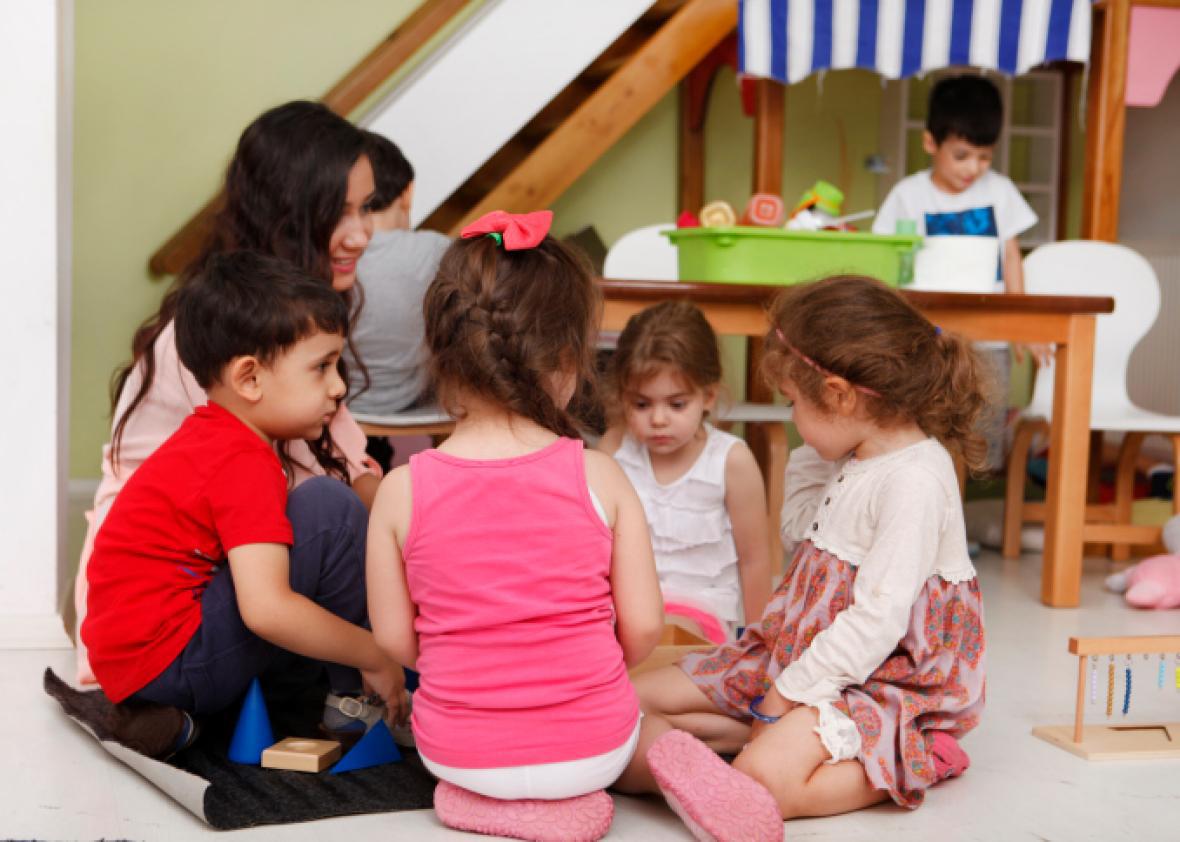These days, the phrase “religious liberty” functions, more or less, as code for “anti-LGBTQ.” But current fights over bathroom access and public accommodations aren’t the first time religious freedom has been used to set up troubling legal frameworks. Take, for example, day care. Sixteen states allow day cares that claim some religious affiliation to bypass certain licensing regulations; six impose little or no regulation on religious day cares at all. All the proprietor needs is a registered religious ministry—no proof of support from a church or any actual religious teachings at the day care.
This legal loophole, as you might imagine, has wrought some horrifying results.
Reveal, a news site run by the Center for Investigative Reporting, has published a harrowing account of one Alabama day care owner who’s faced repeated allegations of child abuse and endangerment—but, since she’s registered under a religious ministry, the state government can’t do much to stop her from opening more day cares. Author Amy Julia Harris reports that Deborah Stokes has opened at least 12 “Christian” day cares in the state, despite the fact that the church she has registered, Alpha & Omega Ministries, does not hold services, engage in outreach, or provide any kind of religious teaching in her child care centers. Every time complaints from parents, employees, health inspectors, or landlords force Stokes to shut down a day care, she opens a new one, moving her facilities from town to town; industrial sector to abandoned warehouse; dim, rusted-out building to porn shop-adjacent storefront.
How could this happen? In Alabama, the most lenient state on this issue, religious groups lobbied in the ‘80s for separation of church and state when it comes to day care, which, they successfully argued, precluded nearly all government oversight. Nearly half of all child care facilities in Alabama—that’s more than 900 day cares—claim religious affiliation, exempting them from inspections, employee training requirements, and mandatory staff-to-child ratios. Unlike other states that excuse religious day cares from some licensing requirements, Alabama doesn’t even let child care regulators investigate any kind of complaint. Only police forces, health departments, and district attorneys have legal authority to keep Alabama’s religious day cares safe for children.
The allegations and reports against Stokes from parents, police, and workers are truly horrendous. They say Stokes has stolen employee wages, smacked children with flyswatters and rulers, put tape over their mouths, left them in high chairs for hours, forgotten to serve them the lunches their parents packed, and failed to change their diapers. There’s more:
[Health inspector Alice] Rollins dropped in on Stokes and found babies lying in carriers on the floor because Stokes hadn’t bought enough cribs. An infant had been neglected for so long that “urine had soaked through its outer garment as it sat on the carpet,” according to Rollins’ notes. Electrical outlets in the kitchen didn’t have childproof plugs or cover plates, making it “very easy for a little finger to touch a live wire,” Rollins wrote. Electric hot pots were overflowing with carrots and chicken even though Stokes had told the health department that she wouldn’t be cooking. … Rollins investigated more than 20 complaints in all and shut down Stokes’ facilities twice more. But that fix was temporary; Rollins lacked the authority to shutter them for good, even when she received complaints that Stokes was hitting children or putting them in danger.
“[Stokes] has been arrested multiple times, for crimes ranging from theft to child endangerment. She doesn’t need a license. She doesn’t need a curriculum or qualified workers,” Harris writes. “All she needs is a building with a roof, desperate parents and a piece of paper saying she runs a church.”
Desperate parents were never in short supply. Harris reports that Stokes targeted what she called “poverty-stricken areas” to offer child care at about $40 per week—less than half the cost of the average Alabama day care. Stokes was able to afford that limited intake by severely understaffing her locations and opening daycares in cheap venues that weren’t up to code. Plus, she didn’t have to pay to keep up with the exacting requirements of child care regulators. Poor families who, of course, needed affordable child care the most have been especially susceptible to the abuses of neglectful religious day care owners like Stokes. One woman told Harris that the Alabama Department of Human Resources recommended one of Stokes’ centers because it was one of the limited number of places that accepted federal subsidies for day care. Stokes has reaped at least $86,000 in government funding to run her subpar, unregulated child care centers.
Sadly, Stokes is not the only example of how the current system is failing kids. Reveal’s investigation found 80 Alabama day care proprietors who reopened their facilities as religious organizations “sometimes just days after regulators took the extreme step of shutting down their licensed day cares.” The report, part of a series called “The God Loophole,” inspired one Alabama state legislator to introduce a bill that would end the religious exemption from day care licensing and provide more funding for the Department of Human Resources to oversee regulation of child care facilities.
There is no plausible religious argument for exempting day cares from basic safety and health requirements. But if the recent debates over “religious liberty” laws have taught us anything about an increasingly popular brand of conservative logic, especially in the South, we can expect Christian groups to claim persecution anyway.
